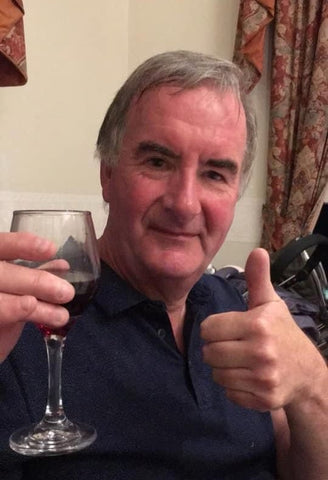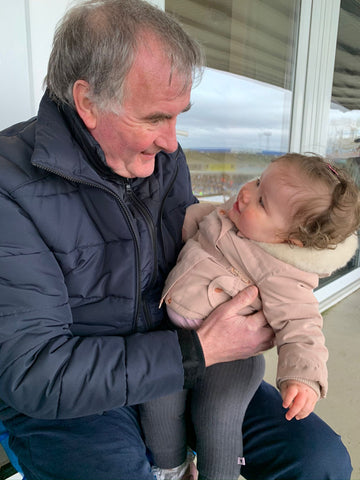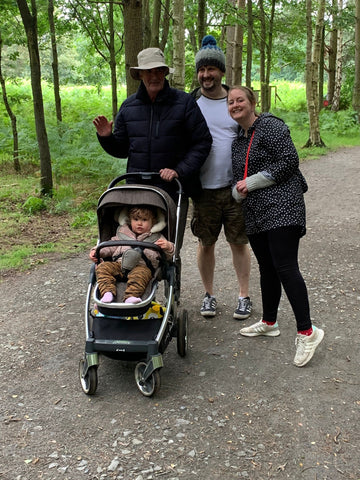Doting grandad, Lez from Shropshire died aged 61 in 2020 just five months after he was diagnosed with a glioblastoma (GBM). It came as a shock to the family, who thought his episodes of confusion and talking nonsense could be linked to his existing diabetes. A biopsy was too risky and treatment deemed too gruelling. His family are frustrated with the lack of investment into research for brain tumours and want to help raise awareness to increase funding.

Here is Lez’s story, as told by his daughter, Emma…
Dad was a single parent to me and my brother Shaun from when I was 10. He was really funny and cared so deeply for his family, making sure that we had everything we needed.
Since the age of seven, dad and I had always watched Telford United together. We had season tickets and he spent seven years as their mascot, Benny Buck. In March 2019 my daughter Sophie, was born so she started coming along. He took great pleasure in seeing her catch the Telford FC bug too.

I first noticed there was something unusual with Dad in early 2020. His character changed and he began talking nonsense. We’d message most days, often about football. I texted him about a new player Telford signed called Courtney and he sent me a message about the singer Courtney Love. He had clearly mixed up the name with a different person.
“Dad talked about strange smells. I’m not sure what he could smell but it was enough for him to bring up in conversation.”
He reassured me that he’d been to the GP who said it’s likely to be linked to his diabetes, something he had lived with for a few years by this time.
He had lost weight without being on a diet and complained of headaches. Another visit to the GP this time thought it could be caused by stress.
About five weeks later, Dad was due to go to work when his wife, Rhonda, had a call from his employer saying Dad hadn’t arrived at work. He was a man that loved routine and you could pinpoint his movements and timings to the minute.
He showed up late and seemed to be in a daze. Rhonda insisted he see the GP again and demanded answers for his long list of symptoms. They referred him to the hospital for a CT scan and found a brain tumour.
It was the same time as lockdown restrictions and Dad was in hospital on his own, receiving the most awful news. They called Rhonda and told her to come to the hospital whilst Dad waited for an MRI.
“I thought it could be an underlying health condition, or something related to his diabetes. I never thought his symptoms were caused by a brain tumour.”
Two days of waiting for the MRI scan result felt like forever. Dad was diagnosed with a glioblastoma (GBM) and told he had just three to six months to live.
The consultant told us they could carry out a biopsy to be sure of his diagnosis, but he may not survive the procedure. In the same breath they told us that treatment wouldn’t be pleasant for Dad and may only prolong his life, not save him.
I researched online but it was only after he died that I realised how prevalent brain tumours are. I did read about alternative treatments outside the UK but they were expensive and came with strict criteria.
Dad never seemed to have a different option for treatment. Doctors may as well have said to us ‘don’t bother nothing will save your dad’.
He died in December 2020, five months after his diagnosis. He was 61.

It’s incomprehensible to think that there were no other options for Dad’s brain cancer.
I’m frustrated for him, for our family and for other patients and their loved ones that will go through the same cycle if we don’t talk about the historic underfunding of this disease.
Emma Dean
January 2024
Brain tumours are indiscriminate; they can affect anyone at any age. What’s more, they kill more children and adults under the age of 40 than any other cancer... yet just 1% of the national spend on cancer research has been allocated to this devastating disease since records began in 2002.
Brain Tumour Research is determined to change this.
If you have been touched by Lez’s story, you may like to make a donation via www.braintumourresearch.org/donate or leave a gift in your will via www.braintumourresearch.org/legacy
Together we will find a cure

